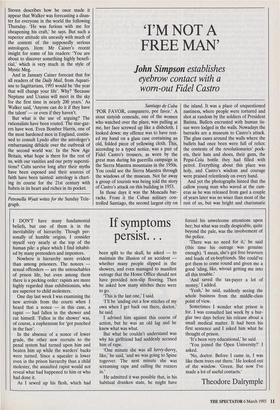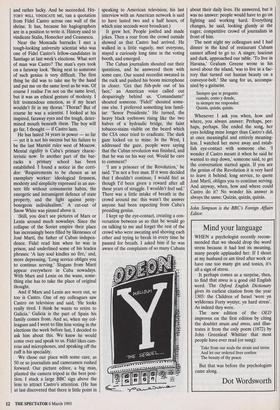TM NOT A FREE MAN'
John Simpson establishes
eyebrow contact with a worn-out Fidel Castro
Santiago de Cuba 'POR FAVOR, companero, por favor.' A stout sixtyish comrade, one of the women who watched over the place, was pulling at me, her face screwed up like a dishcloth. I looked down: my offence was to have rest- ed my hand on a glass case containing an old, folded piece of yellowing cloth. This, according to a typed notice, was a pair of Fidel Castro's trousers, as worn by the great man during his guerrilla campaign in the Sierra Maestra mountains in the 1950s. You could see the Sierra Maestra through the windows of the museum. Not far away a group of tourists was being told the story of Castro's attack on this building in 1953.
In those days it was the Moncada bar- racks. From it the Cuban military con- trolled Santiago, the second largest city on the island. It was a place of unquestioned nastiness, where people were tortured and shot at random by the soldiers of President Batista. Bullets encrusted with human tis- sue were lodged in the walls. Nowadays the barracks are a museum to Castro's attack. The glass cases around the walls where the bullets had once been were full of relics: the contents of the revolutionaries' pock- ets, their hats and shoes, their guns, the Pepsi-Cola bottle they had filled with petrol. Everything about this place was holy, and Castro's wisdom and courage were praised relentlessly on every hand.
And yet the photographs hinted that the callow young man who waved at the cam- eras as he was released from gaol a couple of years later was no wiser than most of the rest of us, but was bright and charismatic and rather lucky. And he succeeded. His- TORY WILL VINDICATE ME, ran a quotation from Fidel Castro across one wall of the shrine. It has, because his hagiographers are in a position to write it. History used to vindicate Stalin, Honecker and Ceausescu.
Near the Moncada barracks I met a tough-looking university scientist who was one of Fidel Castro's fellow-candidates in Santiago at last week's elections. What sort of man was Castro? The man's eyes took on a faraway look. 'Being next to someone of such genius is very difficult. The first thing he did was to take me by the hand and put me on the same level as he was. Of course I realise I'm not on the same level, but it was an ethical gesture of modesty. I felt tremendous emotion, as if my heart wouldn't fit in my thorax.' Thorax? But of course he was a scientist. I looked at his inspired, faraway eyes and the tough, deter- mined mouth beneath them. The boy will go far, I thought — if Castro lasts.
He has lasted 34 years in power — so far — yet it is not his success but his failure to be the last Marxist ruler west of Moscow. Mental rigidity is Cuba's primary charac- teristic now. In another part of the bar- racks a primary school has been established. I found a notice in the corri- dor: 'Requirements to be chosen as an exemplary worker: ideological firmness, modesty and simplicity expressed in an aus- tere life without consumerist habits, the energetic and intransigent defence of state property, and the fight against petty- bourgeois individualism.' A cut-out of Snow White was pinned above it.
\Still, you don't see pictures of Marx or Lenin around much nowadays. Since the collapse of the Soviet empire their place has increasingly been filled by likenesses of Jose Marti, the father of Cuban indepen- dence. Fidel read him when he was in prison, and underlined some of his leaden phrases: 'A lazy soul kindles no fire,' and, more depressing, 'Long service obliges you to continue serving.' Slogans from Marti appear everywhere in Cuba nowadays. With Marx and Lenin on the wane, some- thing else has to take the place of original thought.
And if Marx and Lenin are worn out, so too is Castro. One of my colleagues saw Castro on television and said, 'He looks really tired. I think he wants to retire to Galicia.' Galicia is the part of Spain his family comes from. And so, when my col- leagues and I went to film him voting in the elections the week before last, I decided to ask him about this. We knew he would come over and speak to us. Fidel likes cam- eras and microphones, and speaking off the cuff is his speciality.
We chose our place with some care, as 50 or so journalists and cameramen rushed forward. Our picture editor, a big man, planted the camera tripod in the best posi- tion. I stuck a large BBC sign above the lens to attract Castro's attention. (He has at last discovered that there is little point in speaking to American television; his last interview with an American network is said to have lasted two and a half hours, of which nine seconds were broadcast.) It grew hot. People jostled and made jokes. Then a roar from the crowd outside showed us that Castro had arrived. He walked in a little vaguely, met everyone, stayed a curiously long time in the voting booth, and emerged.
The Cuban journalists shouted out their questions, and he answered them with some care. Our sound recordist sweated in the nick and pushed his boom microphone in closer. 'Get that fish-pole out of his face,' an American voice called out despairingly behind us. `Comandante!' shouted someone. 'Fidel!' shouted some- one else. I preferred something less famil- iar: 'Senor Presidente.' He turned, the heavy black eyebrows rising like the two halves of a hydraulic bridge, the faint tobacco-stains visible on the beard which the CIA once tried to eradicate. The dark gaze locked on to mine. In the West, I addressed the gaze, people were saying that the Cuban revolution was finished, and that he was on his way out. Would he care to comment?
'I am a prisoner of the Revolution,' he said. 'I'm not a free man. If it were decided that I shouldn't continue, I would feel as though I'd been given a reward after all these years of struggle. I wouldn't feel sad.' There was a little intake of breath in the crowd around me: this wasn't the answer anyone had been expecting from Cuba's presiding genius.
I kept up the eye-contact, creating a con- versation between us so that he would go on talking to me and forget the rest of the crowd who were sweating and shoving each other and trying to break in every time he paused for breath. I asked him if he was aware of the complaints of so many Cubans about their daily lives. He answered, but it was no answer: people would have to go on fighting and working hard. Everything changes, he said, looking glumly at the eager, competitive crowd of journalists in front of him.
The next night my colleagues and I had dinner in the kind of restaurant Cubans cannot afford to go to. A singer, luscious and dark, approached our table. 'To live in Havana,' Graham Greene wrote in his novel about the island, 'was to live in a fac- tory that turned out human beauty on a conveyor-belt.' She sang for us, accompa- nied by a guitarist.
Siempre que te pregunto cuando, como y donde, tu siempre me respondes: Quizas, quizas, quizas.
Whenever I ask you when, how and where, you always answer: Perhaps, per- haps, perhaps. She ended the song, her eyes holding mine longer than Castro's did, at once meaningful and entirely meaning- less. I watched her move away and estab- lish eye-contact with someone else. 'I wonder if Castro meant it when he said he wanted to step down,' someone said, to get the conversation started again. If you are the genius of the Revolution it is very hard to leave it behind; long service, to quote Jose Marti, obliges you to continue serving. And anyway, when, how and where could Castro do it? No wonder his answer is always the same: Quizas, quizas, quizas.
John Simpson is the BBC's Foreign Affairs Editor.



















































 Previous page
Previous page